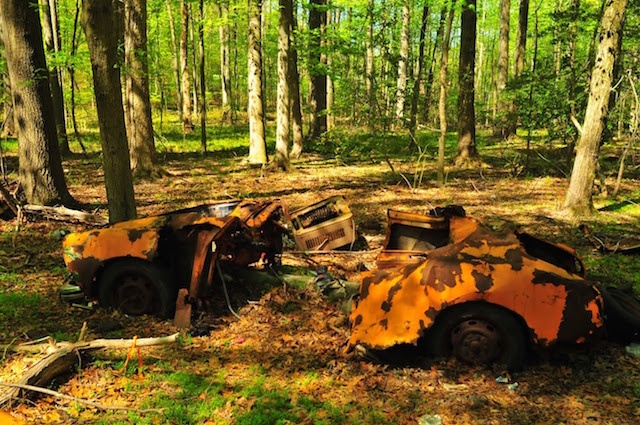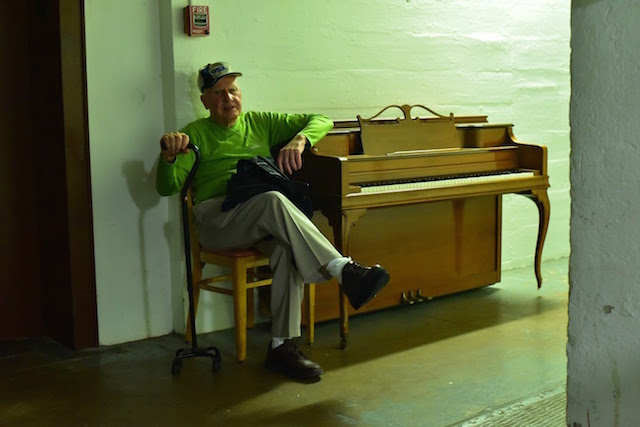
by Pete Shaw
The Denville Public Library, my father tells me, is the only one around. This is no surprise as Denville, a small town just off Interstate 80 in upstate New Jersey, had a population of 16,635 according to the 2010 census. Next to the library is the Denville Historical Society. There is a bright light on it that during the Winter, when my father is still awake as it shines, reminds him of something in literature. He knows what it is, but he wants to see if my knowledge is so keen.
“Gatsby?” I answer.
My father is impressed.
It is a beautiful New Jersey Spring day amid ten days of beautiful New Jersey Spring days, the way I remember them from when I lived here. The heat and humidity of Summer have yet to set in, and the still young green of the oaks, maples, beeches, and other deciduous trees contrast gorgeously against the big, blue sky. We get to enjoy it all from the porch of the Saint Francis Residential Community which for the past five years has been my father’s home.
There are quite a few seats on the porch, looking out over the vast front lawn which includes a fine selection of the aforementioned trees. There is a nice breeze that provides a welcome if unnecessary cooling, adding ambience more than anything else. On such days, the seats fill fast, and I find myself quickly giving mine up to sit on the seat that folds from my dad’s walker.
“Do you know who that is?” my dad asks, nodding toward Kathleen. I say Yes, and tell him her name, Kathleen, not Catherine, as she once told me she is called as often as her real name. This does not bother her, but it is so. Or maybe it does not bother her because it is so. Most of the people here are elderly, and many of them are suffering from some degree of fading memory, such as my father who at 94 has early stage Alzheimer’s Disease. Kathleen, Catherine, what does it matter in the end if she is addressed with Kindness?
Kathleen is from the Bronx. She spent much of her youth living in an apartment on the fourth floor of some building that had no elevator. One morning she told me about the games she and other kids used to play in the streets. Bob, from Brooklyn, played similar games, as did my dad, who too is from Brooklyn. I was unfamiliar with the names of the games, and I was about equally unfamiliar with the games themselves. I said one sounded like leap frog. Bob dryly commented that when playing leap frog, the odds of you breaking vertebrae are slim.
Kathleen now spends her time between St. Francis and Florida where she winters. But wherever she goes she has her yarn and knitting needles.
“I know her name is Kathleen,” my dad says testily. “But who is she?”
“Madame Defarge?”
And once again my dad is impressed.
Through the window, I see Vince walking through the lobby. Vince sits at my dad’s meal table, along with Don and Mars. Vince is a truly Kind and considerate person, radiating gentleness. He is most fastidious at the table, applying a precise amount of spread to his bread, and arranging his used plate, cutlery, glass, and coffee mug to save the waiter some time and effort. My dad likes him, but often says he knows nothing about him. So I ask. Vince grew up in northern Manhattan, near the field where the Columbia University football team used to practice. That field, he tells me, is now covered by an apartment complex.
Yankee great Lou Gehrig attended Columbia after graduating from Commerce High School. My dad had a part time job at Commerce High School while a student at City College of New York and once got to see Gehrig’s grades. He now has a starting point.
Don, like M. Defarge, is also from the Bronx, and like Vince, he sits at my dad’s meal table. He lived near Pelham Bay, and when I mention the movie starring Walter Matthau and Robert Shaw, The Taking of Pelham 123, he tells me he used to ride that train. He sings in a men’s choir, the Morris Music Men, and because his allergies are bothering him every morning I see him, he plans on spending the morning in his room with a warm, wet cloth across his face, trying to learn his part in the MMM’s rendition of The Beatles’s “Here Comes the Sun.”
Mars completes the quartet. He hails from Virginia, and he spent 45 years in the US Marine Corps. Vietnam, he says, was his war. During that war, he met his wife, a Vietnamese woman he met in Japan. With a little over two months to go in his second tour, Mars pulled some strings and had his future wife and about 15 members of her family flown to Virginia. He promised he would return, and he did. He will not be in St. Francis for much longer because in a couple of weeks he and his wife, who lives up the road, will be taking a camping van across the country, visiting their many relatives.
Back on the porch, Dorothy and Alice have taken seats. Alice was born in Carbondale, Pennsylvania. My dad recognizes the name, asking if it was a small industrial town on a hillside. Indeed, it was, Alice says, and she enjoyed it there. Her family later moved to Kearny, New Jersey. I tell Alice that it is a place that has produced great soccer players. She tells me a pretty famous football player was from there, and sure enough, Kearny’s own Alex “Red” Webster was an excellent halfback and fullback for the New York Giants and later coached the team.
Alice later moved to Denville, right on the border near Boonton. She worked for the Denville town government, and then later for Morris County. Those government jobs, she said, did not pay well, but they had great benefits.
Dorothy nods. Her husband worked some government job. She was born in Newark, New Jersey right near Branch Brook Park. She had misheard my dad when he said he was from New York, and she begins talking about the park and then Newark in great detail. My dad knows some of what she is talking about, but little more than most people who have never lived there. Still, Dorothy is enjoying talking about it, and it is interesting. Later, she tells us she was a nurse, and she took part in the first kidney transplant in New Jersey.
While the porch is nice, my dad needs to take his walk. We go down the steps and then head along the driveway toward Diamond Spring Road. My dad now uses a walker wherever he goes, which even after a few years of it still seems a little odd to me. After all, the man used to jog about 1.5 miles every day until he was in his late 70s.
Across the road is the Denville Public Library. It is the only one in Denville. Next to it is the Denville Historical Society.
“Gatsby?”
Near where Diamond Spring Road intersects with Pocono Road, there is a bench that my father likes to sit upon. And so we sit. When my brother is around, he reads to my dad here. There is an election coming up, and in the grassy divider on Pocono Road is a sign for a candidate of the surname Bergen. Growing up, we were Friends with a family of the same name, but this Bergen does not have the same first name of any of those Bergens. Each time my dad sees the sign, he wonders about Jim, the father of my Friend of the same name, and his older brother, Keith, who was my brother’s Friend. The older Jim was a truly Kind man, always good fun on Boy Scout campouts.

As my dad is 94 and has seen a lot, it seems a good time to ask big questions. What would he have done had he not gone into chemical engineering? Apparently, chemical engineering in the end offered greater excitement than what had been his original thought of occupation, accounting. It’s a wild world out there.
Does he fear death? No, he does not.
Does he have any regrets in life…outside of birthing me?
“I was going to say that!” he laughs.
We must keep moving. Up the sidewalk we continue. There are benches in small grove of trees just to our left. My dad laments that they are rarely used.
Up a road in the back of St. Francis we go. I am not usually here this early in the year, and so for the first time I see the peonies in bloom. My dad says he does not remember them from last year. This is true. He had been in the hospital with a broken foot when they flowered. I tell him that a Friend’s mother once told me the German word for the plant translates to Pentecost, the name being given because the flower reminded someone of a tongue of fire.
Soon we sit on a bench near a grotto dedicated to Our Lady of Lourdes. Protected from the elements in a small glass structure is a statue of Bernadette who saw the vision of the Virgin Mary. My dad thinks she should get a better house. I comment that I bet she doesn’t throw stones.
My dad is a devout Roman Catholic, and before I was born, he led a group of church members on a pilgrimage to Lourdes. I am, as the fellas say, a recovering Catholic–an irreverent one at that–and I am skeptical of such sightings. About 30 years ago in my hometown, a man also saw Mary. He proclaimed this to the news, and thousands of people flocked from all around to see. What a nice coincidence that the man also owned a nearby field that could be used as a parking lot, five bucks a car. The Lord works in mysterious ways, they say, but the authorities were having none of it. The local bishop declared the vision unsubstantiated, and if my memory serves me well, the man was later busted for something like fraud. My dad, as I recall, never visited. He has a keen if sometimes oddly calibrated bullshit detector.
It’s getting close to lunch. As we continue our walk, we pass Pat. My dad is glad to see him. Pat organized a lot of the activities at St. Francis, and he was their resident computer expert. I too am glad to see him. He is a friendly, gregarious man.
“It’s nice seeing you Peter. You taking care of your dad?”
“When I can. I hear you’ve moved to greener pastures.”
“The greener pastures of grandchildren,” he says with a smile.
I see my dad off to his lunch and then head back to my brother and sister-in-law’s home. They live only a couple of miles away, closer as the crow flies. I while away the time preparing dinner and taking care of whatever needs taking care of. My dad takes a nap after his meal, and so it is about 4:00 when I see him again. We have time for another walk, and then we sit near a small garden that my dad can see from his apartment window. He asks me about the plants. He also notes that a house across the street is ugly. I can’t identify all the plants, and I agree with his aesthetic sense.
Soon my brother pulls up. Here we are, together, three-fourths of what once was. These moments, always too rare, and even 9 years later still glaring for the absence of my mother, now take on special meaning even as our interactions reveal an easy familiarity that comes with lifetimes of Love.
We take my dad up to his building for dinner, and then head back to my brother’s place for our own. Then I head back for a nightcap, back on the porch.
Carol and I have a connection of sorts. She met her husband in the Pacific Northwest. He was from Whitbey Island, near Seattle, Washington. They dated for two years before she became his second wife. Their union lasted 35 years, most of them on Long Beach Island, about 120 miles south of where we sit. When he passed in 2012, Carol’s stepdaughter moved her here.
Carol has something of a stern face. She looks like you’d better stay out of her way. And perhaps you should. She tells me, her face breaking into a gentle smile, that her walker is a Harley. Don asks her how good her insurance is, betting, unlike his, it does not cover inflating the tires. It strikes me as humor that is rarely heard outside of places like this. Perhaps I should be depressed by it, but I find it uplifting. The humor is Kind, and it is received as such. With a sly grin, Carol gets up, and threateningly bucks her walker a few times in Don’s direction, and the gesture is received with a laugh.
Betty gets out of a car and ascends the stairs to the porch. She is 90, but you’d never guess that. Betty shares my last name, but she comes from a different line. Her family hails from just up the road in Rockaway, a place they began living in around the time of the Revolutionary War. When I tell her that my father’s ancestors came from Ireland in the 19th century, she simply takes pleasure in the coincidence of a shared surname.
Betty is spry, and she often goes to the theater. In fact, she is returning from there now. Earlier she had told me she has subscriptions to three different playhouses. A few years ago, she stopped going into Manhattan for plays, saying she was too old for the trips. Not because they exhaust her, although that is a factor, but because they are inefficient. She can see more theater by staying local.
One of those theaters is the Papermill Playhouse. When I was a kid, my parents took me and my brother there around Christmas for The Nutcracker. I still remember a loud blast that I associate with what I guess was the emergence of the King Rat. Or maybe it came with his defeat. Regardless, it terrified me. Still, the memory of going there is a good one, even if I do not remember the story.
It is time for trivia. Bob moderates, and about 15 people including my dad sit around to try and answer the questions he draws from Trivial Pursuit. Bob is an engaging person. He is crotchety in a New York way, which is to say there is something of a wink to his crustiness. It seems that every other comment from his mouth makes me laugh, reminding me how much I miss the dryness that is a pillar of humor in much of the Northeast. It promotes banter among everyone around the table, which strikes me as remarkably healthy.
Toward the end of play, Bob poses some question about a woman journalist who for years toiled at her craft, but was often passed over for promotion, presumably leapfrogged by men. But around 1980 she got her break and achieved her goal, becoming the White House reporter for her publication. I forget her name and for what outlet she wrote. Her name is the answer, and after a woman gives it, another woman says, “Oh, I remember her. She died not much after she finally got the job.”
Bob is not a man given to poetic moves. And so it is all the more profound to my ears, in this place where people are living out their final years–often with great beauty, but also with great loneliness, and a lifetime of joys and regrets, some forgotten, some still acute–that he imparts a form of grace seemingly so at odds with his gruff personality. “But,” he notes in an uncharacteristically gentle tone, “at least she was there.”
These is my days. What they lack in visceral excitement, they more than make up for in meaning. Everyone has a story, and their exchanged stories bring forth more. Eventually, ten days later, full of stories, I must leave and return home.
Prior to heading to the airport, it is another beautiful morning on the porch. And soon it is another beautiful morning for a walk.
The Denville Public Library, my father tells me, is the only one in town. The building next door is the Denville Historical Society.
“Gatsby?”
Soon again, my dad has to go to lunch. I have to go to the airport. We go into the main hall, outside the dining room. It is crowded with people waiting for the doors to open. Levine, who cleans the residents’ rooms, knows I am leaving. She tells me she will look after my dad. She is a lovely person, and I know she will.

The doors open. My dad and I exchange a hug and kiss, and we tell each other we Love each other. Through 49 years of my life, or at least the ones for which I have recall, he has always told me that upon some form of departure: going to school, going out for the night, heading back to my new home, and when finishing phone calls. Always the same, never rote. Many times have my Friends expressed jealousy, and while on my best days I am agnostic, every time I hear it, I feel blessed.
We turn to our paths. As I head out toward the porch and the green light beyond I hear Levine say, “Don’t cry, John. He’ll be back soon.”






